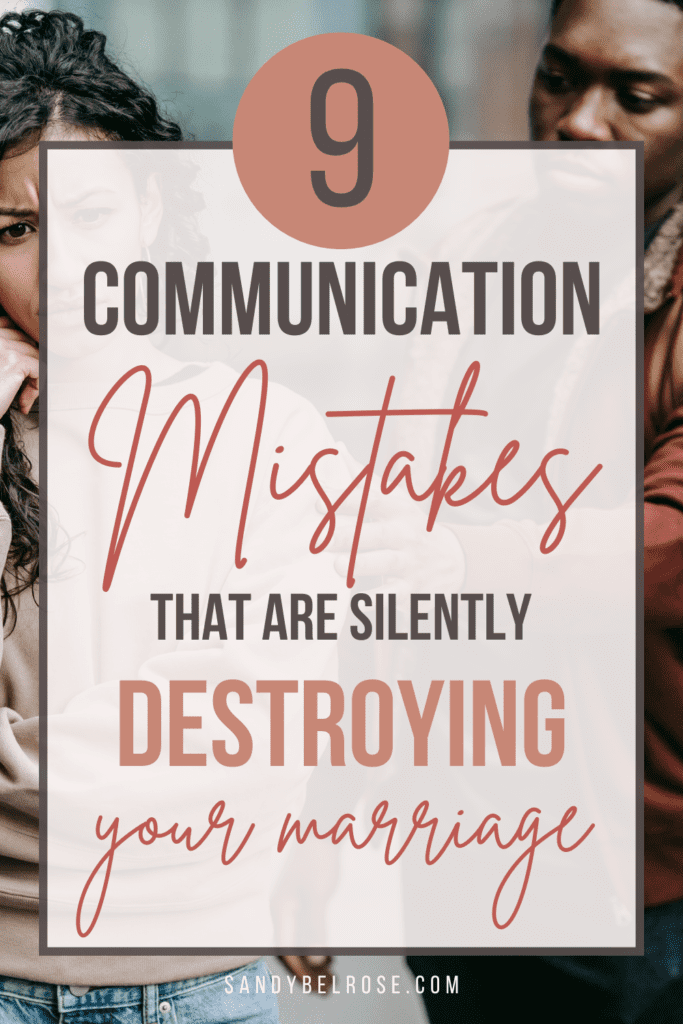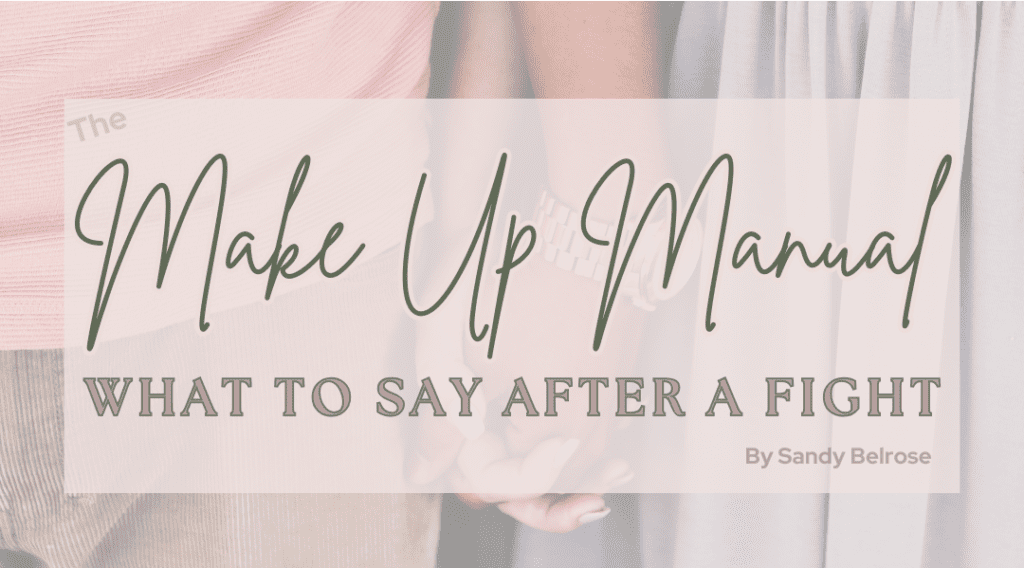9 Communication Mistakes That Are Silently Destroying Your Marriage
How Communication Mistakes Can Slowly Ruin Your Marriage
Because the way you talk to each other matters more than you think…
Every marriage faces challenges, but poor communication is one of the biggest reasons relationships start to break down.
Maybe you:
❌ Feel like your husband never really listens when you talk
❌ Keep having the same fights over and over again without resolution
❌ Struggle to express your needs without starting an argument
❌ Say things you regret in the heat of the moment
The truth?
Most couples don’t struggle because they fight too much. They struggle because they don’t know how to communicate in a way that strengthens their marriage instead of breaking it down.
And if you’re making these common communication mistakes, they could be silently destroying your marriage—without you even realizing it.
Let’s go through the 9 biggest mistakes that are ruining your marriage communication and what you can do instead to start rebuilding trust, connection, and understanding.
Pin It For Later ⬇️

9 Communication Mistakes That Are Ruining Your Relationship
1. Expecting Your Husband to “Just Know” What You Need
You sigh loudly. You get quiet. You drop hints.
And still… nothing.
If you’ve ever thought, “He should just KNOW what I need without me having to say it,” that’s a communication trap.
Why This Hurts Your Marriage:
💡 What to Do Instead:
Say what you need directly instead of waiting for him to figure it out.
Use phrases like:
Clarity = connection.
Your marriage will improve when you stop assuming and start communicating.
2. Turning Every Disagreement Into a Battle to “Win”
Let’s be real—when you argue with your husband, do you want to resolve the issue… or do you just want to prove you’re right?
Why This Hurts Your Marriage:
💡 What to Do Instead:
3. Ignoring Him When You’re Upset Instead of Talking About It
The silent treatment feels like a way to make him understand how hurt you are—but it actually does more harm than good.
Why This Hurts Your Marriage:
💡 What to Do Instead:
4. Criticizing Instead of Expressing Your Feelings
🚫 What NOT to say:
❌ “You never listen to me.”
❌ “You’re so selfish.”
❌ “You always do this!”
Why This Hurts Your Marriage:
💡 What to Do Instead:
Use “I” statements instead of attacking. Say:
Struggling to get your husband to truly listen?
Learn exactly what to say with my FREE Marriage Communication Cheat Sheet—download it below!
Free Cheat Sheet: “Say This, Not That”
10 Easy Phrases for Better Conversations With Your Husband
Ditch the awkward silences and endless fights—Grab my FREE “Say This, Not That” cheat sheet and discover 10 proven phrase swaps to defuse tension and reconnect with your husband—no more walking on eggshells!
5. Interrupting or Defending Yourself Instead of Truly Listening
Ever been in a conversation where you can tell the other person isn’t really listening—they’re just waiting for their turn to talk?
Yeah, that doesn’t help.
Why This Hurts Your Marriage:
💡 What to Do Instead:
6. Saying “I’m Fine” When You’re Clearly Not
Pretending you’re okay when you’re not? It never works.
Maybe you don’t want to start another argument. Or maybe you’ve been conditioned to suppress your feelings to “keep the peace.”
But saying “I’m fine” when you’re hurt doesn’t resolve anything—it just buries the problem until it explodes later.
Why This Hurts Your Marriage:
💡 What to Do Instead:
7. Apologizing Just to End the Fight (Without Really Meaning It)
Ever said “I’m sorry” just to make a fight go away?
It might feel like the quickest way to move on—but an insincere apology only pushes the problem further down the road.
Why This Hurts Your Marriage:
🚫 Weak Apologies That Don’t Work:
❌ “I’m sorry you feel that way.” (Translation: That’s your problem, not mine.)
❌ “Fine, I’m sorry. Happy now?” (Translation: I don’t really mean this.)
❌ “I said I was sorry, can we move on now?” (Translation: I just want to end this conversation.)
💡 What to Do Instead:
8. Expecting Him to Change Without Changing Yourself
It’s easy to think, “If only HE would change, our marriage would be better.”
And while your husband absolutely has a role in your relationship, waiting for him to change while doing nothing yourself is a dangerous trap.
Why This Hurts Your Marriage:
💡 What to Do Instead:
9. Letting Unresolved Fights Build Up Over Time
Fights don’t ruin marriages—avoiding resolution does.
It’s tempting to ignore conflict and hope it disappears on its own. But when fights go unresolved, resentment builds, and emotional walls go up.
Why This Hurts Your Marriage:
💡 What to Do Instead:
A Fight Doesn’t Have to Break Your Marriage—But Unresolved Conflict Can
Fighting with your husband doesn’t mean your marriage is broken. Every couple has disagreements. But when these communication mistakes keep happening, they slowly erode trust, create resentment, and push you further apart.
Think about it—have you ever had a fight where the actual issue wasn’t as big as how it made you both feel? Maybe you weren’t really fighting about the dishes, the forgotten plans, or the tone of voice. You were fighting because you felt unheard, unseen, or unappreciated.
And after the fight, what happens?
For a lot of couples, one (or both) of these things:
❌ The silent treatment. You don’t know how to fix things, so you just wait it out in uncomfortable silence, hoping it blows over.
❌ A half-hearted apology. One of you says, “I’m sorry,” just to move on, but the issue isn’t really resolved.
❌ Avoidance. You both act like nothing happened, but deep down, resentment lingers.
❌ A repeat fight. Because the real issue was never dealt with, the same argument keeps happening in different ways.
The truth is, fights don’t ruin relationships—how you handle them does.
If you let unresolved fights pile up, it creates distance, resentment, and emotional disconnection. But when you take the time to repair things the right way, conflict can actually make your relationship stronger.

Struggling to Know What to Say After a Fight? Here’s the Missing Piece.
Now that you know what NOT to do, the real question is:
👉 How do you actually fix things after a fight?
Because let’s be honest—knowing how to break the tension and reconnect after an argument is HARD.
If you’ve ever:
❌ Felt stuck, unsure of how to start the conversation
❌ Worried that saying the wrong thing would make things worse
❌ Apologized just to “move on” but still felt disconnected
Then you need a step-by-step plan for what to say after a fight—so you can actually repair, reconnect, and move forward stronger.
That’s exactly why I created The Make Up Manual: What to Say After a Fight.
Let’s be real—saying “I’m sorry” isn’t always enough. How you communicate after a fight determines how quickly (or if) you and your partner can truly move forward.
Don’t leave your marriage in silence—know exactly what to say and how to repair your relationship after a fight
Click below to grab The Make Up Manual now and start healing your relationship today!






